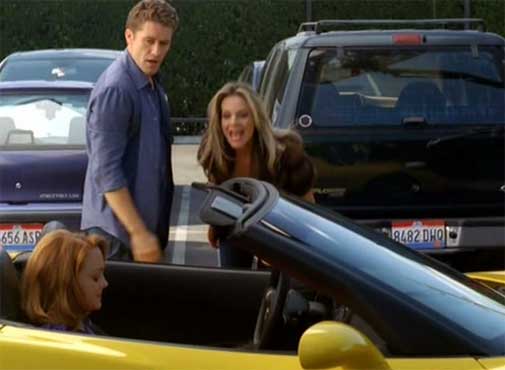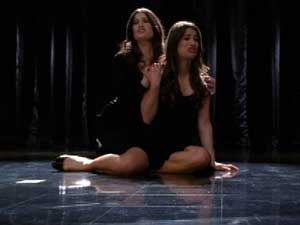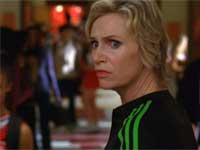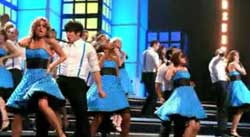
I wonder what's next for Glee. Knighthood? An installation at the Louvre? The Nobel Peace Prize?
Nothing much would surprise me now that the Fox musical-comedy-fantasy-melodrama, which begins its second season Tuesday at 8 p.m. ET, has become the most over-praised TV series since, well, I can't think of a close second, let alone an equal.
It recently picked up an Emmy to go along with its Peabody and its Golden Globes. I wouldn't be shocked if the members of the Motion Picture Academy created a new category so they can give it an Oscar.
Seems like every time I watch any Fox prime-time show, I encounter an in-house promo citing critics' raves for Glee, including a quote from TV Guide to the effect that it "raises the bar for all of television."

Please. Glee is a nice little show, sort of a cross-breeding of American Idol and the old ABC Afterschool Specials. Over the course of its brief life, it has tirelessly contended that, as Mac Davis once put it, "music in the universal language, and love is the key, to peace, love and understanding, and living in harmony."
More specifically, it has put forth the proposition that a school music program can enable kids representing rich and poor, ebony and ivory, the jocks and the preppies, the bullies and the nerds, the straight and the gay, the overweight and the anorexic, the handicapped and the buff to see beyond their petty differences and find common purpose in life. And exchange wistful looks at least once per episode as they recognize their personal growth.
Well, OK, lovely. At a time when schools are ditching chorus and band and other extracurricular arts programs for lack of funds, it's great PR. And far better this than another voyeuristic melodrama about serial killers or another sitcom about a pudgy doofus with an improbably gorgeous wife. But the notion that Glee is historic, epochal, phenomenal television is silly.
The Wire raised the bar. The Singing Detective raised the bar. Friday Night Lights raises the bar. Glee? Well, it's the best musical-drama series since Cop Rock, although not as daring or original.
Given the success of Disney's High School Musical franchise, I'm not surprised that somebody thought, "High school, music, big box office, hmmm -- what if we did a series about teens who are in a glee club? And what if we have them sing songs their parents grew up on? OMG!!!"
What Glee portrays is much more akin to a high school's theater department or some sort of showstoppers troupe, not a glee club. I realize I've been out of high school more than a couple of years and that things change, but I still think of a glee club as being a choral unit whose members join their voices on songs like Oh Shenandoah and Battle Hymn of the Republic, not a collection of Idol-ready soloists who take turns backing each other up in a medley of hits by Olivia Newton-John or Journey.
But even if I'm being overly technical -- or old-fashioned -- about this, there's still the problem that the basic dramatic tension in Glee is strained. We're supposed to believe that the members of New Directions, the glee club at McKinley High School in Lima, Ohio, not only struggle to be recognized and respected by their classmates and the school's administration, but that they have sworn enemies out to undercut them at every turn?

Enter Sue Sylvester, the unscrupulous, power-mad cheerleading coach who has made it her mission to embarrass and undercut New Directions and its faculty advisor, Will Schuester, by any means possible. Every school or office has its petty despots, to be sure. But to find a TV nemesis as caricatured as scheming, skulking Sue, you have to go back to Boss Hogg or Sheriff Roscoe in The Dukes of Hazzard.
Yes, Sue had a mild attack of decency in the season finale, using her clout at McKinley to see to it that New Directions got another year's trial (and, conveniently, the series another season). But it's unlikely her change of heart will be anything but fleeting. Her over-the-top antagonism is an essential contrivance of the show.
But, you may say, what about the music? Where else on television can you turn to hear songs from My Fair Lady and West Side Story and Sweet Charity, songs made famous by Aerosmith and Lady Gaga and Gary Puckett and the Union Gap?

Nowhere. Not even on Idol, which has never had much use for show tunes. And I applaud the producers for sneaking in occasional reminders of musical theater's grand history. But is it too much to ask that the performances by Glee's undeniably talented cast bear a bit more resemblance to reality?
This is supposed to be high school, right? And these kids are presumably amateurs. Yet their rehearsals quickly elevate to improbably elaborate, misstep-free choreography, and the public performances are so intricate, they could have come straight from a Broadway stage.
The problem with Glee is never sour notes, just false ones.